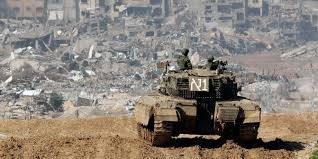Israel's Perpetual State of Conflict: A Cycle of Violence with No End in Sight
The Israeli-Palestinian conflict has been a longstanding and intractable issue, with periods of relative calm punctuated by outbreaks of violence. Despite numerous attempts at peace negotiations, the conflict remains unresolved, and Israel appears to be stuck in a perpetual state of war.
The current situation is a stark reminder of the complexities and challenges of the conflict. The Israeli military has been conducting operations in the Gaza Strip and the West Bank, resulting in the deaths of numerous Palestinians and the destruction of infrastructure. The Palestinian militant group Hamas has responded with rocket attacks on Israeli cities, causing widespread fear and disruption.
The conflict has also had a profound impact on the lives of ordinary Israelis and Palestinians. Many Israelis live in fear of rocket attacks and terrorist incidents, while Palestinians in the Gaza Strip and the West Bank face severe restrictions on their movement and access to basic necessities like food, water, and healthcare.
Despite the efforts of international mediators, including the United States, the European Union, and the United Nations, a lasting peace agreement has proven elusive. The Israeli government has expressed a willingness to negotiate, but its conditions for talks, including the recognition of Israel as a Jewish state and the rejection of Palestinian refugees' right of return, have been deemed unacceptable by the Palestinian leadership.
The Palestinian Authority, led by President Mahmoud Abbas, has also faced criticism for its handling of the conflict. The authority has been accused of corruption and inefficiency, and its security forces have been criticized for their human rights record.
Hamas, which has controlled the Gaza Strip since 2007, has also been a major obstacle to peace. The group's refusal to recognize Israel's right to exist and its continued rocket attacks on Israeli cities have made it a pariah in the eyes of many in the international community.
The conflict has also had significant regional implications. The Iranian government, which has long been a supporter of Hamas and other Palestinian militant groups, has used the conflict to further its own interests in the region. The conflict has also strained relations between Israel and its Arab neighbors, including Jordan and Egypt, which have traditionally been more sympathetic to the Palestinian cause.
In recent years, the conflict has also taken on a more complex and multifaceted nature. The rise of extremist groups like ISIS and the increased involvement of other regional actors, including Turkey and Qatar, have added new layers of complexity to the conflict.
Despite the challenges and complexities of the conflict, many Israelis and Palestinians remain committed to finding a peaceful resolution. Grassroots organizations and initiatives, such as the Israeli-Palestinian peace movement, have worked tirelessly to promote dialogue and understanding between the two sides.
However, without a fundamental shift in the approach of the Israeli government and the Palestinian leadership, it is unlikely that a lasting peace agreement will be reached anytime soon. The conflict will likely continue to simmer, with periodic outbreaks of violence and ongoing human suffering.
- _Israeli Prime Minister Benjamin Netanyahu:_ The Israeli leader has expressed a willingness to negotiate with the Palestinians, but his conditions for talks have been deemed unacceptable by the Palestinian leadership.
- _Palestinian President Mahmoud Abbas:_ The Palestinian leader has faced criticism for his handling of the conflict and his security forces' human rights record.
- _Hamas Leader Ismail Haniyeh:_ The Hamas leader has refused to recognize Israel's right to exist and has continued to advocate for rocket attacks on Israeli cities.
- _Iranian Involvement:_ The Iranian government has used the conflict to further its own interests in the region.
- _Strained Relations with Arab Neighbors:_ The conflict has strained relations between Israel and its Arab neighbors, including Jordan and Egypt.
- _Palestinian Refugees:_ The conflict has resulted in the displacement of millions of Palestinians, many of whom remain refugees to this day.
- _Israeli Civilians:_ The conflict has also had a profound impact on the lives of ordinary Israelis, many of whom live in fear of rocket attacks and terrorist incidents.




No comments yet
Be the first to share your thoughts!